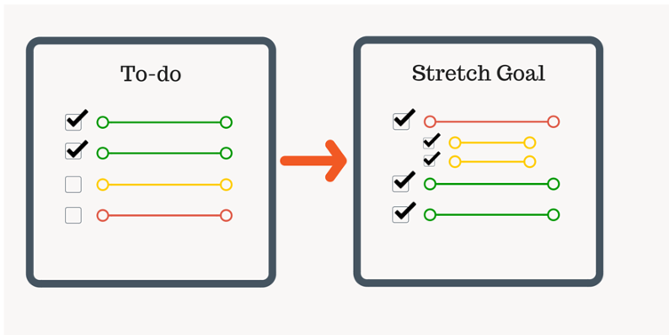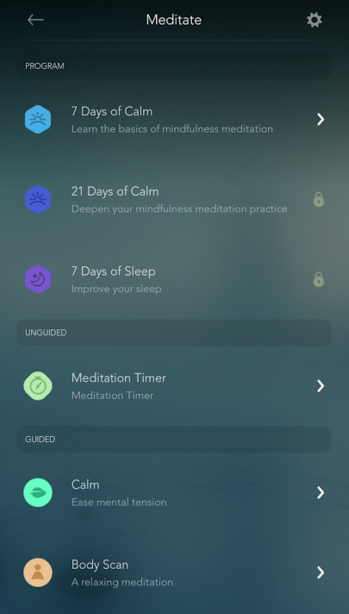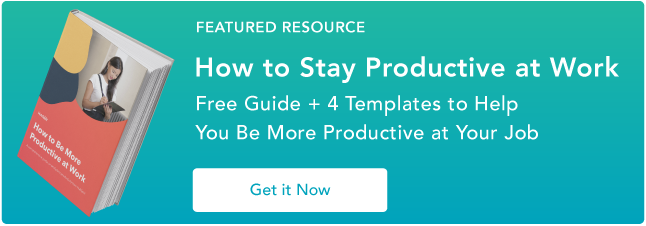
Off days. We all have them from time to time.
Maybe you didn’t sleep well the night before, or perhaps you’re working on a project that isn’t particularly exciting. Or maybe there’s no viable explanation at all, and you’re just straight up not feelin’ it that day.
First of all, that’s OK. We can’t be on all the time. Motivation is an ebb and flow: We all have periods of high energy where productivity comes easily, as well as periods of low energy where your work doesn’t come so easily.
But alas … unless we’re physically ill, we’re all expected to show up at work and get our work done regardless of how tired we are or how “meh” we’re feeling.
It’s times like these when we need to find that motivation within ourselves. The next time you’re feeling exhausted, unmotivated, or lethargic at work, try one or a few of these 10 ways to get motivated again.
10 Ways to Get Motivated When You’re Exhausted
1) Just get started.
Have you ever found yourself faced with a deadline or a looming task, only to realize that was the perfect time to clean your house or start a new season of 24? Turns out, that’s your brain playing tricks on you.
A study by Dr. John Bargh, an award-winning psychology researcher, showed that, before we start on a big project, our brain attempts to simulate real, productive work by focusing on small, mindless tasks. The result? We don’t get started on the tasks that are most meaningful. And the longer we procrastinate, the more anxious we feel.
Thankfully, once you get over that hump of just starting already, you’re more likely to work ’til it’s done. That’s a phenomenon called the Zeigarnik Effect, which is best defined as “the tendency to experience intrusive thoughts about an objective that was once pursued and left incomplete.”
That’s why, sometimes, we don’t need a particular thing to motivate us — we just need to get started, and a more focused and productive mental state will follow.
2) Make or rework your to-do list. (The right way.)
When your energy is low, it can be hard to get in that get-stuff-done mindset. So when you feel yourself dragging, stop what you’re doing and take a few minutes to either make a new to-do list or rework the one you already have.
After all, studies show that when we write down our goals, we’re more likely to achieve them. This small step can not only help your productivity, but it can also help get rid of that uncomfortable, anxious feeling you get when you procrastinate.
There are a lot of different ways to make a to-do list — and what works for you may not work for your neighbor. But it turns out there is one similarity to how most of us write our to-do lists: We tend to start with the easier tasks first, and save the daunting tasks for last. That way, we can cross items off the list faster … and feel good about it.
But according to Charles Duhigg, saving the harder stuff for last increases stress and other negative emotions. To more effectively motivate yourself with a to-do list, Duhigg suggests:
- Thinking of your stretch goal for the day.
- Writing down this goal at the top of your piece of paper or worksheet.
- Breaking down your goal into actionable, measurable, and manageable steps.

To get started, think about what part of that broken-down task you can accomplish right now or today, and begin working on it with the more manageable and achievable goal in mind.
3) Commit publicly.
Accountability works. None of us likes to look bad in front of others. Chances are, if you’ve promised to do something publicly, you’ll be more likely to achieve it. That’s why so many people do things like create public blogs or Instagram accounts to hold themselves accountable for fitness and weight loss goals.
You don’t have to go public with your goals to reap the benefits of accountability. You can do it with coworkers, or with friends and family.
For example, here at HubSpot, the blogging team holds a daily standup meeting where we come together in the morning to list out what we plan to get done that day. If we find ourselves repeating the same task over a series of consecutive days, it becomes clear to ourselves and our colleagues that we either need to prioritize that task to get it done, or reevaluate whether it really needs doing in the first place. (You can also use collaborative to-do list apps like Trello or Wunderlist to share tasks with others digitally.)
Simply recruiting a reliable friend to become your accountability buddy can help, too. Psychology professor Dr. Gala Matthews conducted a study on goal achievement in the workplace worldwide. She found that more than 70% of the participants who sent weekly updates to a friend either completely accomplished their goal or were more than halfway there. Compare that with 35% of those who kept their goals to themselves without even writing them down.
4) Change up your location.
According to Duhigg’s research, your physical environment is one of the most powerful drivers of our habits and behaviors.
Take the six-month study published in The American Journal of Public Health, for example. The scientists that ran the study found that by changing the environment and the way food and drinks were displayed in a large hospital cafeteria, they could get people to eat and drink healthier — without even thinking about it. Just by moving bottled water closer to the cashier and moving soft drinks away from it, the number of soda sales dropped by 11.4%, while bottled water sales increased by 25.8%.
Similarly, where you work can affect your motivation levels. Duhigg says this might be because we mentally assign behaviors, habits, and routines to particular locations, like bed for sleeping, desk for working, couch for relaxing. (Another reason taking your lunch break away from your desk can do wonders for your productivity.)
Need to really focus? Step away from your desk, move to a workspace with no distractions, and hone in on whatever it is you need to do. That’s what Amanda Sibley, a demand generation manager at HubSpot, told me works for her: “If there is something I must get done in a day — a deck due to our CMO, for example — then I turn off email and shut myself in a room for an hour or so until it’s done.”
5) Listen to pump-up music.
Music motivates us. Think about it: Why do people listen to music when they go to the gym? Because it gives us energy.
We don’t just have an emotional reaction when we listen to music; we also have a physical reaction. Music engages our bodies’ sympathetic nervous systems. Our airway opens, our heart accelerates, and our muscles become primed for movement. When the speed, intensity, or volume of the music rises, our pulse quickens and our breathing accelerates.
This is great for physical exercise, of course. But it’s also great for reenergizing you when you’re feeling tired or bored. Not only will it help refocus you, but studies have shown that music can help draw our attention away from the negative aspects of whatever task we’re doing.
“During my training and races it became obvious that even in really horrible weather conditions, or when I was physically suffering, that I could use music (and my imagination) to create a parallel universe that had little to do with reality,” said Jacob Jolij, an athlete and researcher from the University of Groningen in the Netherlands. “I used music to stay optimistic and see the glass as perpetually half-full while doing ultra-endurance races. You can use music as a tool when you work out or in your daily life the same way. “
So the next time you’re tackling something that doesn’t quite thrill you, consider putting on some happy tunes. If you need some music ideas, try one of these science-backed productivity playlists.
6) Meditate.
Listening to pump-up jams not your cup of tea? Perhaps meditating is.
It’s funny: We rest our aching muscles after a tough workout without a second thought, and yet we expect our brain to work hour after hour, day in and day out. It just doesn’t make sense. Burnout is real, folks.
Taking ten or twenty minutes out of your workday to meditate is a great way to use a break time — especially when you find your attention and motivation wavering. According to one study, intensive meditation can help you focus and sustain your attention — even during the most boring of tasks. It also helps boost your mood: A 2012 study found that people who mediated “stayed on tasks longer and made fewer task switches, as well as reporting less negative feedback after task performance.”
Never meditated before? You don’t need any experience to enjoy the benefits of meditation — especially with the many apps out there that offer guided meditations. Next time you feel disconnected or unmotivated at work, try using one of these free apps:
- Headspace: This app gives you 10 free guided meditation sessions. If you end up getting hooked, you can sign up for a monthly subscription.
- Calm: This app offers over two-dozen guided meditation session for you to choose from that range from a few minutes long to about 30 minutes long.

7) Talk to a coworker. (Or talk to yourself.)
Sometimes, taking a short break to talk with a colleague can be enough to reenergize you for several more hours. In a study of call center workers, those who talked to more coworkers in between calls actually got through calls faster and felt less stressed — all while having the same approval ratings as their peers.
If you just need a break from the task at hand, grab a coworker and talk a short walk. If you need some inspiration, choose that coworker wisely, and use the time to bounce ideas off of them. If you’re really struggling, try asking them for advice on how to refocus or reprioritize.
If you’re working from home or no one’s available, leave your current workspace (see tip #4: change up your location) and interact with someone — anyone. “Go outside and find a human to interact with — ordering your coffee, running an errand, whatever,” suggests my colleague Corey Wainwright.
Or, give yourself a pep talk. Giving yourself advice and encouragement in the second-person voice actually works, according to a study on self-motivation from the University of Illinois at Urbana-Champaign.
“People are used to receiving and giving advice in the second-person, and they seem to prefer using the second-person pronoun to psych themselves up before engaging in action,” study coauthor Dr. Sanda Dolcos told The Huffington Post. “Self-advice expressed using ‘You’ probably enables people to adopt a broader perspective, considering how a significant other might view the event, and to reproduce the kind of encouragements previously received from others.”
8) Eat an energy-boosting snack.
Food is fuel for our brains and our bodies. What we eat — and when we eat it — has a direct impact on our performance at work. Recent studies show that willpower is a limited resource and depletes throughout the day, but may be strengthened by the food we eat.
To function at its best, your brain needs a constant supply of glucose and fat that come from the right nutritional sources — i.e., not junk food. Our brains work best with about 25 grams of glucose circulating in our blood stream, which is about the amount found in a banana. So when we’re feeling sluggish, snacking on a banana between meals can actually help us reenergize our brainpower.
On the other hand, if we were to snack on something high in sugar, like a handful of M&Ms, then we risk a much higher blood sugar spike followed by a crash. While we may feel energized for a short period of time, we’ll ultimately enter into a slump. The result? Low energy and low productivity.
The same is true for coffee, which only gives us short caffeine bursts. (If you love coffee, though, try bulletproof coffee, which has a longer-lasting, positive effect on your energy levels.)
Healthy snacks that’ll supercharge your brainpower and help you gain energy when you’re tired include bananas, yogurt, blueberries, avocados, olive oil, salmon, broccoli, eggplant, and dark, leafy greens. (Check out our infographic on “the productivity diet” to learn why these foods help you focus.)
9) Move your body.
Whether it’s spending some quality time at the gym or simply going for a short walk between meetings, regular exercise can do wonders for your health, your happiness, and your productivity and energy levels at work. In fact, researchers have found that people who exercise during normal working hours are actually more productive at work, even if they technically log fewer hours.
Another study out of the University of Georgia examined whether exercise can be used to treat fatigue. It showed that even low-intensity exercise can significantly help feelings of fatigue.
“A lot of people are overworked and not sleeping enough,” said Patrick O’Connor, co-director of the university’s exercise psychology laboratory. “Exercise is a way for people to feel more energetic. There’s a scientific basis for it, and there are advantages to it compared to things like caffeine and energy drinks.”
Here are 10 ideas for sneaking in exercise at work without looking silly, from taking short “active breaks” to replacing your desk chair with a stability ball.
10) Take a power nap.
Another way to unleash your brain’s natural energy? Take a power nap. Researchers have found there are clear benefits to napping, including increased alertness after your nap. The key is doing it right. In other words, napping for the right amount of time, and at the right time of day.
According to Sleep Expert Dr. Phyllis Zee of Northwestern University, the best naps are between 1 p.m. 3 p.m. and last between 20 and 40 minutes.
That afternoon timing is best for your body clock, whereas napping later in the day can affect how well you sleep that night. Taking a nap longer than 40 minutes can cause your brain to slow-wave (deeper) sleep, which’ll leave you waking up in a state of confusion — the opposite of what you were trying to solve for.
Then, once you’re up from your nap, get back to it.
What if it doesn’t work?
If you’ve tried some of these tactics and none of them are helping you refocus and reenergize, be careful: You might be burned out.
Burnout is defined as a state of chronic stress that leads to physical and emotional exhaustion, cynicism and detachment, and feelings of ineffectiveness and lack of accomplishment. Although people experience burnout differently, a telltale sign is when you’re experiencing the trifecta of exhaustion, cynicism, and inefficacy all at once.
Remember: It’s OK to take your foot off the gas pedal every once in a while and to adjust your work output to your current motivation level.
But if you’re feeling the symptoms of burnout, take care to dedicate specific time for unplugging and relaxing — and even take a vacation if you can. It’s good for you, and even your boss would agree: 91% of business leaders believe their employees return from vacations recharged and ready to work more effectively.
How do you get motivated when you’re tired? Share with us in the comments.
![]()


